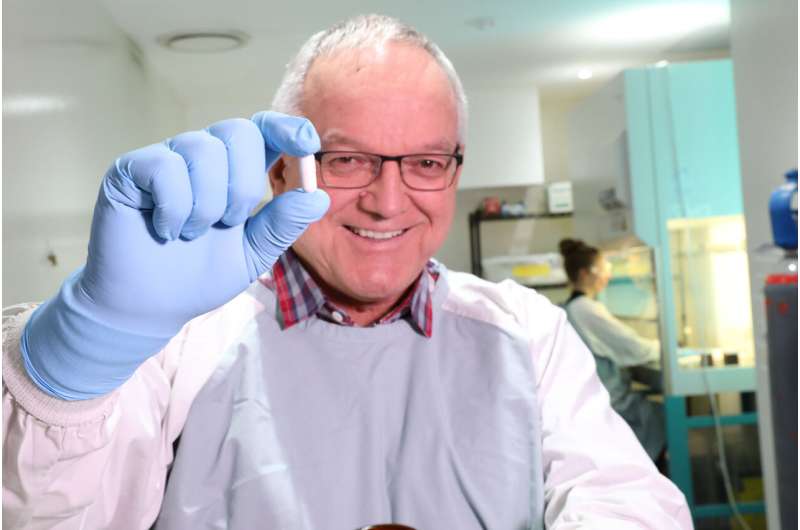Study: Antibiotic and 'crapsule' therapy eliminate need for further treatment of Crohn's disease

The Centre for Digestive Disease (CDD) headed by Professor Thomas Borody has cured Crohn's disease as reported today by Dr. Gaurav Agrawal in Gut Pathogens.
Professor Borody is internationally recognized for curing stomach ulcers caused by H. pylori, and is currently researching the infection connection associated with heart disease. He is also a leader in fecal microbiota transfer (FMT) and pioneered the innovative treatment process in Australia.
Crohn's disease was until today an incurable and debilitating gut disease that affects 75,000 people in Australia and almost 3 million globally.
Curing Crohn's disease has been a global priority with 1,455 Crohn's disease clinical research studies currently listed on ClinicalTrials.Gov.
According to the study published in Gut Pathogens, "prolonged remission has been achieved for three to 23 years with individualized treatments," and reports patients discontinuing all Crohn's therapies.
Professor Borody and his team devised a treatment of specific antibiotics combinations and doses, and/or FMT. In FMT procedures, the gut microbiome bacteria from a healthy donor is transferred to the gut of a patient with a damaged gut ecosystem to repopulate the gut with a healthy and balanced microbiome.
Each year, Crohn's disease results in frequent hospitalizations and surgical procedures, and is life-threatening. The research study was funded by the CDD and involved 10 Australian patients. The team was led by Professor Borody and included Dr. Gaurav Agrawal, Dr. Annabel Clancy and Dr. Roy Huynh.
Professor Borody has overseen more than 37,000 FMT processes at the CDD, making him the most experienced FMT specialist in the world. He and his world-class team use FMT to treat and manage a range of gut health conditions.
In the study, the researchers write, "Crohn's disease (CD) is a chronic inflammatory process of the digestive tract characterized by deep ulcerations, skip lesions, transmural inflammation, fistulae and granulomas, with no known cure. It has a negative impact on many aspects of quality of life, including physical, social, psychological, and sexual functioning... Crohn's disease (CD) is rising in incidence and has a high morbidity and increased mortality. Current treatment use immunosuppressives but efficacy is suboptimal, and relapse is common. It has been shown that there is an imbalance present in the gut microbiome (dysbiosis) in CD with a possible infective aetiology—Mycobacterium avium subsp. paratuberculosis (MAP) being the most proposed. Antibacterial therapy and fecal microbiota transplantation (FMT) are emerging treatments which can result in clinical and endoscopic remission if employed correctly. The objective of this study was to report on the treatment and clinical outcomes of patients with CD in prolonged remission. "
Professor Borody said this breakthrough opens the way for Crohn's treatments using the antibiotic combination and a "crapsule"—an oral capsule of freeze-dried donor fecal microbiota for FMT.
More information: Gaurav Agrawal et al, Profound remission in Crohn's disease requiring no further treatment for 3–23 years: a case series, Gut Pathogens (2020). DOI: 10.1186/s13099-020-00355-8
















